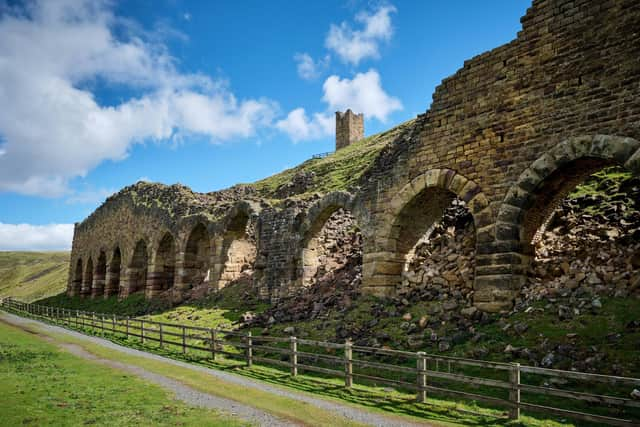Historic Rosedale iron kilns on Yorkshire moors that powered Industrial Revolution at risk of collapse due to row over funding their upkeep
Talks are ongoing between the North York Moors National Park Authority, Rosedale Commoners and the Rural Payments Agency over how to deliver the funding to shore up the arches of the colossal Victorian Rosedale East iron kilns.
The talks come several years after the authority identified during a National Lottery-funded project that the ironstone kilns, which helped helped to make Teesside the centre of the international iron market in the late 19th century, were at imminent risk of failure due to weathering.
Advertisement
Hide AdAdvertisement
Hide AdThe monumental kilns, which can be seen for miles around in Rosedale, were built to refine ironstone ore to cut transport costs to Durham and later Teesside, where it would be smelted into iron, and closed with the General Strike in 1926.


By then, about 11 million tonnes of ironstone had from the valley had been used in construction projects around the world.
A meeting of the park authority on Tuesday will hear a Countryside Stewardship agreement granting funds of £1.46m for the conservation of the kilns had been offered by the Rural Payments Agency to the Rosedale Commoners, who include two tenant farmers.
The agency has stipulated that the agri-environment money the farmers receive for maintaining the moorland ecosystem cannot be separated from the proposed conservation work on the kilns.
Advertisement
Hide AdAdvertisement
Hide AdAs the agency is providing taxpayers’ money, its officers say the grant will only be given if all the costs are paid for up front and then a single claim is made by the commoners.
Jonathan Murray, who has served as the treasurer of the Yorkshire Federation of Commoners, said due to the cost of the conservation works the Government funding to make upland sheep farming across the 300-hectare common more viable while improving vegetation quality was out of reach.
Due to the cashflow impasse the agency is considering whether it can accept stage payments for what is believed to be a 16-month project.
Mr Murray said: “The financial ties are preventing it from going ahead.
Advertisement
Hide AdAdvertisement
Hide Ad“The losers as it stands are both the estate and the farmers as they can’t get the agri-environment agreement back into play.”
Referring to the agency’s offer of funding, a report to the park authority meeting on Tuesday states: “Whilst in theory this is excellent news for the conservation project… in practise the conservation project is almost certainly not currently deliverable.
“The authority is working with the Rosedale Commoners to investigate whether a loan from a third party to the Commoners could help to provide the upfront financing required for the project, although this is potentially challenging with the amount of funding required.”
The park authority has about £100,000 it would contribute towards the conservation project.
Advertisement
Hide AdAdvertisement
Hide AdAn authority spokeswoman said some of the arches were “at imminent risk of collapse”, but there was optimism that it could intervene before “losing the integrity of the entire structure, meaning it would irretrievably lost as a feature of the landscape”.
Referring to the conservation funding, she added: “At the moment it’s not looking very practical. We are in conversation with the Rural Payments Agency and the pragmatic solution is staged payments.”
The Rural Payments Agency has been approached for a comment.
